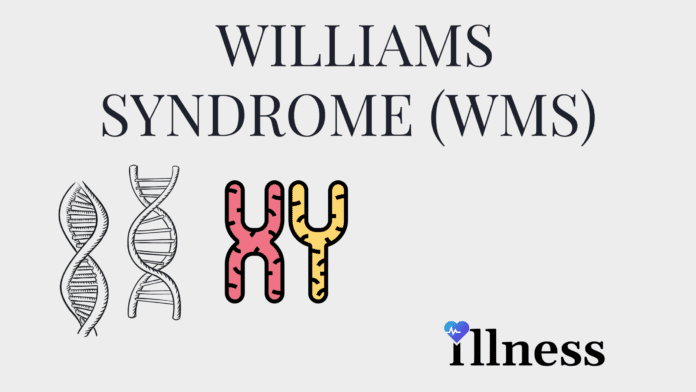Overview Of Williams Syndrome
Williams Syndrome (WMS) is a rare disorder. It can lead to problems with development.
Commonly Associated With
Williams-Beuren syndrome; WBS; Beuren syndrome; 7q11.23 deletion syndrome; Elfin facies syndrome
Causes Of Williams Syndrome
The cause of Williams syndrome is not having copies of 25 to 27 genes on chromosome number 7. In many cases, the gene mutations will occur on their own. They take place inside the egg or sperm that the baby develops from. However, there is a 50% chance of children inheriting it once a parent carries the genetic change.
One of the missing genes is the gene that produces the protein elastin. Elastin gives blood vessels and other tissues in the body the chance to stretch. When a person is missing a copy of this gene, it can result in the narrowing of blood vessels, stretchy skin, and flexible joints seen in this condition.
Symptoms Of Williams Syndrome
Symptoms of Williams syndrome can include:
- Feeding problems, including colic, reflux, and vomiting.
- An inward bend of the small finger.
- A sunken chest.
- Heart disease or blood vessel problems.
- Developmental delay.
- Mild to moderate intellectual disability, learning disorders.
- Delayed speech that may later turn into strong speaking ability and strong learning by hearing.
- Being easily distracted, attention deficit hyperactivity disorder (ADHD).
- Personality traits including being very friendly, and trusting strangers. Also fearing loud sounds or physical contact, and being interested in music.
- Short stature, compared to the rest of the person’s family.
The face and mouth of someone with Williams syndrome may show:
- A flattened nasal bridge with small upturned nose
- Long ridges in the skin that run from the nose to the upper lip
- Prominent lips with an open mouth
- Skin that covers the inner corner of the eye
- Partially missing teeth, defective tooth enamel, or small, widely spaced teeth
Exams & Tests
Signs can include the following:
- Narrowing of some blood vessels
- Farsightedness
- Dental problems, such as teeth that are widely spaced
- High blood calcium level that can cause seizures and rigid muscles
- High blood pressure
- Loose joints that can change to stiffness as the person gets older
- Unusual star-like pattern in iris of the eye
Tests for Williams syndrome should include:
- Blood pressure check
- Blood test for a missing piece of chromosome 7 (FISH test)
- Urine and blood tests can check calcium levels
- Echocardiography combined with Doppler ultrasound
- Kidney ultrasound
Treatment Of Williams Syndrome
Currently, there is no cure for Williams syndrome. Patients who can should avoid taking extra calcium and vitamin D. In addition, treat high blood calcium if or when it occurs. The narrowing of blood vessels can also be a major health problem. Treatment is based on how severe it is.
Physical therapy is helpful if experiencing joint stiffness. Developmental and speech therapy can also be helpful in some cases. Having strong verbal skills can help make up for other weaknesses. Other treatments should be based on the person’s symptoms. Treatment coordinated by a geneticist who is experienced with Williams syndrome can be helpful.



